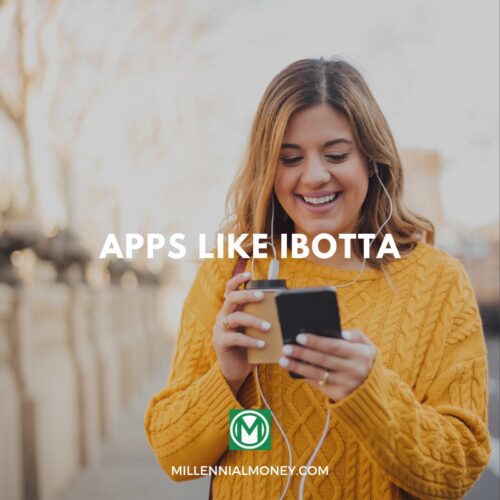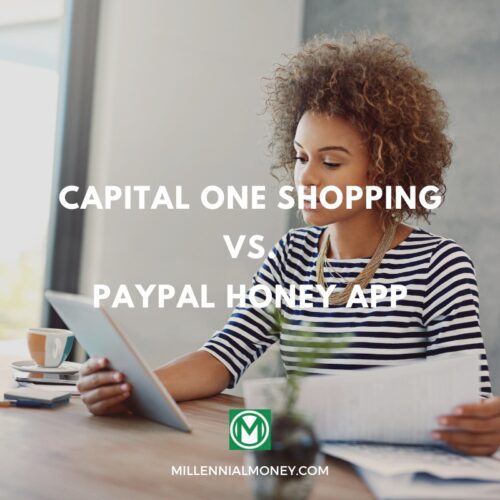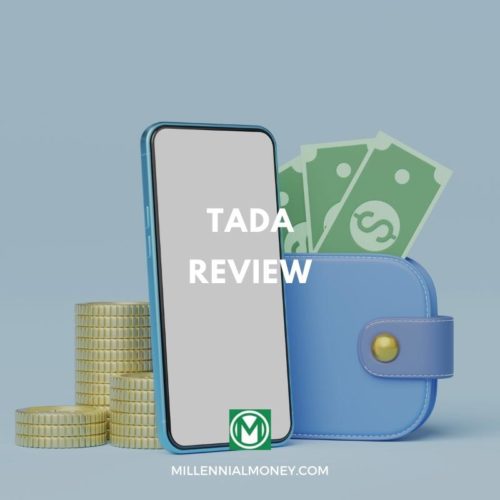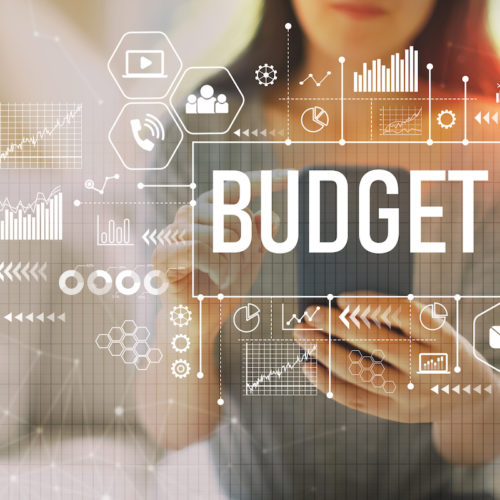Building a savings habit can be hard, but everyone has the ability to do it. In today’s world, there are so many convenient money saving apps right at our fingertips to help us make it easier.
There are a few different ways to save money through apps; the type that works best for you depends on your current financial position and your goals.
12 Best Money Saving Apps
Here are the best apps that help you save money:
- 🏆 Capital One Shopping
- Acorns
- Rocket Money
- Current
- UpSide
- Albert
- KashKick
- MyPoints
- Digit
- Qapital
- Ibotta
- Trim
1. Capital One Shopping
Capital One Shopping offers a free browser extension for Chrome, Edge, Firefox, or Safari which automatically compares prices as you shop online.
As you add items to your cart at an online retailer, like Amazon, Capital One Shopping will search the web for better deals and coupon codes. You can set up notifications so you’ll automatically know about price drops and discounts.
You can follow the links to other provider retailers offering a better price and use applicable codes to save. You can even use the Capital One Shopping app while shopping at brick-and-mortar stores.
Learn More:
2. Acorns
By using your Acorns debit card, your spare change will automatically get rounded up and placed in an investment account.
You can create a portfolio based on your income and goals; your choice could be more conservative or more aggressive depending on the amount of risk you’re willing to take for a high yield. Acorns portfolios are made using ETFs from companies like Vanguard and BlackRock.
Acorns Later can help you save for retirement, at the cost of $2 a month, while Acorns Spend is a checking account you can open for $3 a month. Otherwise, the basic cost of Acorns is just $1 a month and will make your life a lot easier with automatic savings.
Learn More:
3. Rocket Money
We all know there’s probably a better deal we could sign up for that would reduce our utility bills, but somehow there’s never time to search for the best offers out there manually. Rocket Money (formerly Truebill) is a finance app that solves this problem.
Instead of you having to call up companies and negotiate for a lower price or search for alternative deals, Rocket Money’s team of negotiators will do it for you. There’s still some level of a time investment since you’ll need to upload all your bills; this can be done by taking photos or logging into your accounts.
Rocket Money helps with lowering all those monthly subscriptions; as we move towards a subscription economy, it’s becoming increasingly harder to stay on top of all the platforms we’ve signed up for, and this often leads to wasted money. Rocket Money will monitor everything you subscribe to and gives you the option to unsubscribe automatically.
Somewhat ironically, there’s a subscription cost of $3 – $12 to access premium services, including the negotiation service, but basic tracking features are available for free. If Rocket Money successfully negotiates down the bills, they’ll also take a 40% commission of the amount saved for up to two years.
Learn More:
4. Current
Current is a mobile banking app with a variety of personal finance planning and monitoring tools that can help you save money. The app currently has more than 4 million members.
In addition to fee-free overdraft protection and ATM withdrawals from more than 40,000 Allpoints throughout the U.S., Current allows you to automatically put funds into high-interest rate “Pods” for different savings goals like a downpayment on a new home. You can earn up to 4.00% APY on each of your Pods, as long as you keep at least $200 in each account.
With Current, you’ll also get a Visa debit card and earn up to 7 times the points and cash back when you use it. If you sign up for direct deposit, you’ll get your paycheck up to two days early. One downside: Current is an app-only banking institution; its website will prompt you for your phone number and send you the link to the app to get started.
Learn More:
5. UpSide
Upside, formerly GetUpSide, provides people with real-time, personalized cash back offers at gas stations, grocery stores, and restaurants through its free mobile app on iOS and Android.
The app will give you up to $0.25 cash back per gallon at more than 25,000 gas stations nationwide. Use the code MM20 to receive a $0.20/gal bonus on your first gas receipt, for savings up to $0.45 per gallon!
You can also get up to 45% back on money you spend at more than 17,000 restaurants, including major fast-food chains.
At grocery stores, you’ll get up to 30% cash back, but it’s important to note that this only applies to certain major cities: Chicago, Los Angeles, Minneapolis, Phoenix, Raleigh (NC), and St. Louis.
Next Steps:
6. Albert
Albert is an all-in-one money management tool that is SIPC- and FDIC-insured. Rather than actual banking services, the Albert app is set up to complement your bank account, savings account, and investment accounts by giving you a big-picture view of all of your finances and helping you stick to your financial goals.
You’ll have to link all your accounts to Albert (the app uses bank-level security and doesn’t sell private info). But once you do, Albert will evaluate your financial standing and help you stay focused on your savings goals.
With Albert, you can also earn cash back on purchases through the Albert Visa debit card, get up to $250 in cash advances, and set up automatic savings goals. Albert also offers investment advice. You may have to pay for more personalized advice through Albert’s Genius subscription (a $14.99 monthly fee) but the app does provide a basic version of all financial services for free.
Learn More:
7. KashKick
KashKick is a relatively new – but legit – “get paid to” site that pays you cash for taking surveys and completing other tasks.
While you won’t get rich with an app like KashKick, survey sites can be an easy way to make a little extra money in your down time. In addition to surveys, you can get paid to play games, watch videos, and complete other tasks. Once you get to a $10 balance, you can request payout.
While KashKick is similar to sites like MyPoints, it’s important to note that its app presence is very limited. You can download the app for Android only (it’s currently not available for Apple iOS). But the app is actually just a guide for using KashKick. To actually get started and make money, you’ll have to use the website.
Learn More:
8. MyPoints
Like KashKick, MyPoints is a GPT site where you can earn rewards – redeemable for cash via PayPal or gift cards to retailers. Unlike KashKick, MyPoints has been around for a while (since 1996) and has both a website and an app for Android and iOS that makes it easier to use.
In addition to getting paid for taking surveys, playing games, and doing other tasks, MyPoints can get you cash back (up to 40%) while shopping at its partner retailers. Cash back comes in the form of points – called MyPoints – that you can again redeem through PayPal or in the form of free gift cards.
MyPoints also offers ongoing sweepstakes and opportunities to get free bonus points, as well as special discounts with a variety of retailers and services and travel deals through companies like Orbitz and Expedia. You can even earn big points for donating to a charity!
Learn More:
9. Digit
If you can’t figure out how much you can afford to save, Digit will help you set up a savings goal (like creating a rainy day fund), then analyze your spending habits and allocate a certain amount to your savings.
If the app knows you have spare money to save, then it will be moved automatically, and if you don’t, it will stop, so there’s no risk of being left with no cash for the basics.
You can sign up for a free trial for a month, and after that, the monthly price is $5.
Learn More:
10. Qapital
By setting goals and rules, Qapital helps you to make the most of your money and to save wisely. There’s a Payday Divvy feature that divides up your commitments between spending and saving.
You’ll also be able to take part in “Money Missions,” which are fun challenges designed to give you insight into smart financial investments.
If you want to invest too, you can use Qapital’s pre-built portfolios, which are tailor-made to the timeline and amount you input.
The main downside is that, although you’ll receive a debit card, you need to pay a fee to use it for spending (but you can use it for online purchases and transfers for free). You’ll also need to pay to use the app: it will cost $3, $6, or $12 depending on the level of resources you want access to.
Learn More:
11. Ibotta
Ibotta is a cashback app that lets you earn points in three main ways: shopping online, scanning receipts, and using Pay by Ibotta in-store to get instant cashback by presenting your discount code to the cashier
The app covers a wide variety of stores, including groceries, clothing, and travel – there are over 300 retailers in total. Why not download the free app and start earning points to redeem for cashback?
Learn More:
12. Trim
The concept of Trim is almost identical to Rocket Money: they negotiate down bill prices and cancel subscriptions. However, there are also some features to help you save money by tracking your spending and offering suggestions about unnecessary splurges.
Trim’s Simple Savings is a feature that automates your savings by transferring a portion of your earnings into savings. You can also access advice about trimming down your debt so that you can cover all fronts of money-saving.
Like Truebill, Trim takes a cut of any savings it can negotiate for you, but it’s slightly cheaper at 33%. Bill cancellation, budgeting tools, and text alerts are all free services.
Learn More:
FAQs
Are there different types of money saving apps?
There are several different types of money savings apps, and all of them work in different ways.
- Cashback and coupon apps work once you connect your account with a credit card you use to shop, or alternatively you can scan receipts or shop through their portal.
- Savings and investment apps provide you with a brand-new card so you can automatically place your spare change or paycheck into a savings or investment account.
- Bill savings apps require you to log all your bills into the app so they can track them for you.
- Investing apps help you use your saved money to invest in different companies to help grow your savings.
Depending on the features offered and the model of the app, they may be free or charge a fee. Bill-saving apps like Truebill charge a commission for savings made, whereas cashback apps are always free but make money from adverts.
Savings and investment apps make most of their money from using yours (like conventional banks) and some from add-ons.
Is there an app that saves your spare change?
Apps that round up purchases to the nearest dollar and save or invest the spare change have increased in popularity over the last few years. Many different money-saving apps now offer the feature; amongst them are Acorns, Stash, and Varo.
However, this isn’t an exhaustive list, and more apps are likely to introduce this feature in the future to meet demand.
Which Money Saving App Best Is For You?
Even if you’re the world’s worst budgeter, it’s still possible to save money as long as you have a smartphone. All you need to do is download a few apps and complete some basic admin tasks before you can passively earn some extra money. If you want to take things a step further, here is a list we have compiled of the best money making apps.
If you can’t afford to save and just want some extra cash to line your pockets, a cashback or bill-checking app can seemingly give you something for nothing. All you have to do is link your card or bills, and the app will check whether you’re eligible for discounts or lower rates.
If you want to save or invest but get drawn into spending the money instead, there are apps that automatically put aside the small change from your purchases to help you reach your goals.
However, don’t fall into the trap of thinking that downloading apps is all it takes to form a solid financial management plan. In reality, it’s just the first step: keeping a budget and tracking your spending is just as important as ever. Thankfully, there’s also an app for that.








No comments yet. Add your own